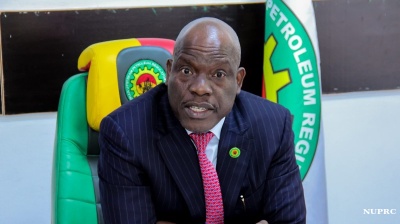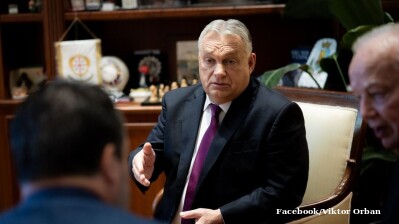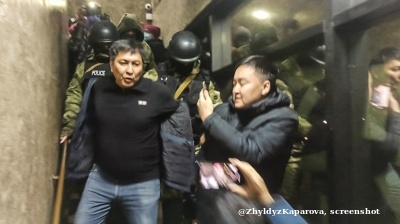Kyrgyz President Sooranbai Jeenbekov on April 19 fired the government of Prime Minister Sapar Isakov, hours after MPs passed a vote of no confidence in the Cabinet. Isakov is seen as close to Almazbek Atambayev, president of Kyrgyzstan from late 2011 until Jeenbekov succeeded him in November last year.
The press service of the president said in a statement that Cabinet members would keep on working until a new government was formed.
The parliament’s move appears to finalise a purge of a series of officials seen as close to Atambayev. The developments challenge the view long expressed by many critics that Jeenbekov would amount to no more than Atambayev’s stooge, with the ex-president intending to continue ruling from the shadows. While Atambayev might indeed have foreseen things turning out that way, Jeenbekov may have rebelled against any idea that he would be some kind of puppet president.
The firing of the Atambayev loyalists followed public criticism of Jeenbekov made by Atambayev on March 31, when he was re-elected as head of the Social Democratic Party (SDPK), of which Jeenbekov is also a member. Atambayev said he would have to "engage in politics again” in order to assist Jeenbekov and prepare the party for the 2020 parliamentary elections. While Atambayev, who calls Jeenbekov an “old friend”, said during the March 31 event that it was necessary to say “harsh words” about the new president in order to help him rule, the latter possibly took the criticisms personally.
Earlier, the president dismissed Prosecutor-General Indira Joldubayeva and two high profile security officials.
Jeenbekov is now expected to issue a dismissal decree on Joldubayeva, who was appointed in January 2015. She has been widely criticised by activists for what they claim was the persecution of opposition politicians and independent media.
Atambayev’s December 2015 constitutional referendum, which weakened presidential powers and strengthened the role of the prime minister, were put in place to maintain SDPK’s control over the country, some Kyrgyzstan watchers say. SDPK holds a parliamentary majority and has the power to fire and appoint prime ministers. The lawmakers, including those of the SDPK, appear to have largely aligned with Jeenbekov in his moves to sack Atambayev loyalists, placing Atambayev’s level of influence further in doubt.
Landlocked and mountainous Kyrgyzstan, a country of 5.7mn, is known for its political volatility. It experienced revolutions in 2005 and 2010, which toppled the regimes of Askar Akayev and Kurmanbek Bakiyev, respectively. Atambayev is often seen as having played a pivotal role in both revolutions. He has presented himself as a champion of democracy, but his popularity has waned over the years against the backdrop of the 2015 referendum and his commitment to keeping SDPK in power.
News

Tanzania election protests trigger curfew; military deployed, internet cut
Demonstrators clashed with security forces in Dar es Salaam, setting a bus and a gas station ablaze, prompting authorities to impose a curfew from 6 p.m. The military was deployed in Dodoma, Zanzibar, and the commercial capital.

US strikes on drug vessels kill 14 in deadliest day of Trump's narcotics campaign
The US military killed 14 people in strikes on four vessels allegedly transporting narcotics in the eastern Pacific Ocean, marking the deadliest single day since President Donald Trump began his controversial campaign against drug trafficking.

Russia withdraws from Cold War plutonium disposal pact with US
Russian President Vladimir Putin has formally withdrawn from a key arms control agreement with the United States governing the disposal of weapons-grade plutonium, as the few remaining nuclear security accords between the two powers vanish.

Nigeria’s NUPRC holds exploratory talks with Bank of America on upstream financing
Nigeria's upstream regulator, NUPRC, has held exploratory talks with Bank of America as the country looks to attract new capital and revive crude output, after falling short of its OPEC+ quota.




